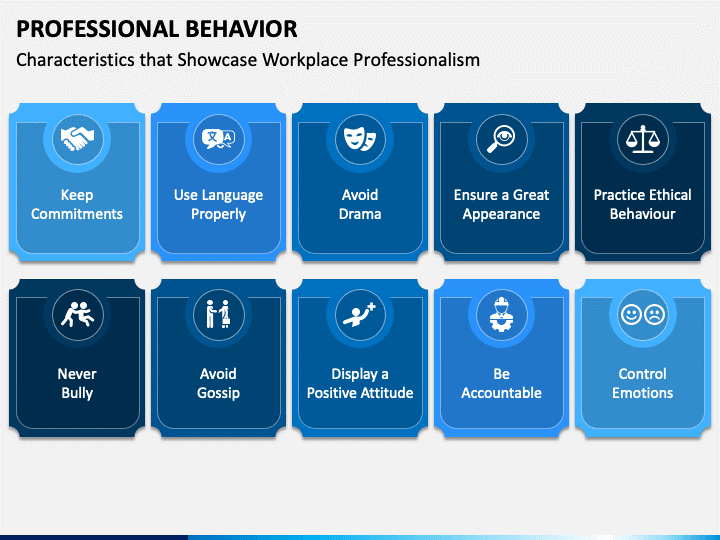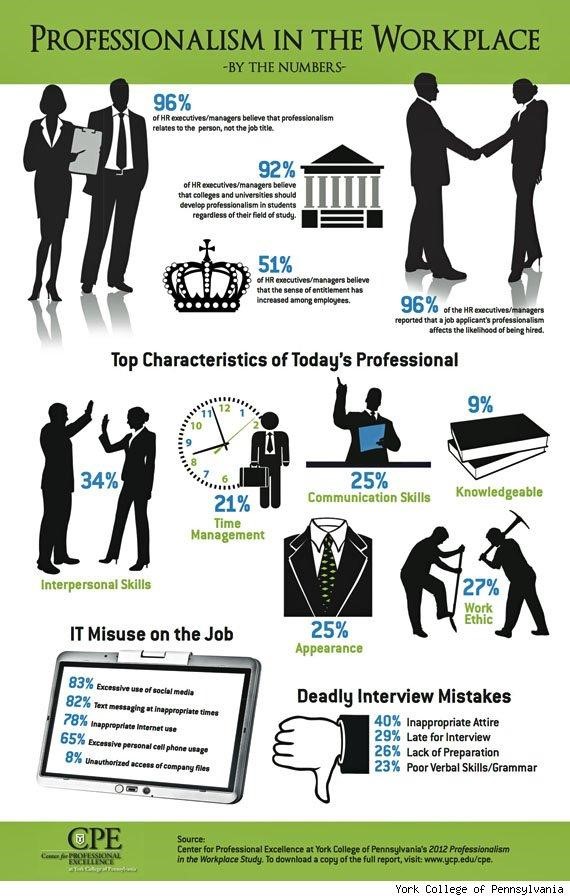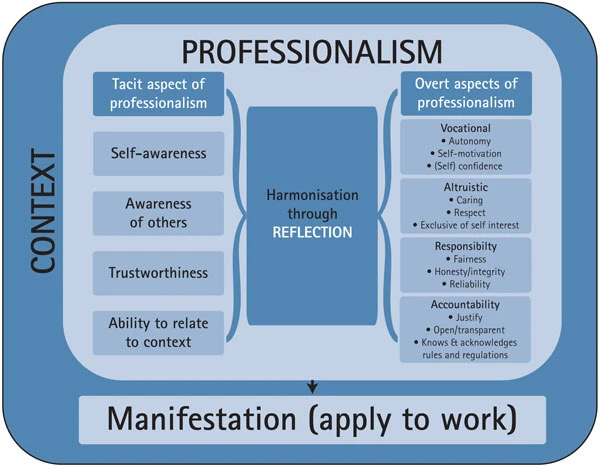1.4 Characteristics of Professionalism in the Workplace


Tasks
Watch this video to gain more insight into the characteristics of professionalism:
Reliability is crucial to workplace success. Departments are more efficient and effective when co-workers can rely on one another to do their part. When you and your teammates trust each other to meet deadlines, produce quality work and respond promptly to requests, it’s easier to meet organizational goals and overcome challenges. To be reliable, you also need to be flexible and focus on your duties when faced with unforeseen obstacles. Consider the difference between an information technology (IT) professional who becomes anxious and alarmed about a software bug and one who acknowledges the issue and calmly moves forward to fix it. Employers prefer to hire professionals who can maintain an even demeanour because they are more reliable and thus more professional.
You can demonstrate reliability in the workplace by:
- Always following up on requests or questions
- Arriving on time or early for work, meetings and events
- Producing a consistent quality of work
- Responding to issues in a consistent manner
- Following processes and procedures
- Giving full attention to the task at hand
Another essential aspect of professionalism is humility or the ability to. Those who exhibit humility are confident without being arrogant and recognize the value others bring to the team. Humility helps people cooperate and work together as a team without one individual considering themself more important than others. Humble employees respect their peers, acknowledge others’ hard work and avoid boasting about personal accomplishments. These professionals often place greater emphasis on how outcomes affect the entire team rather than themselves.
You can demonstrate humility in the workplace by:
- Seeking ways to help develop others alongside yourself
- Acknowledging your mistakes
- Asking for assistance when necessary
- Accepting constructive criticism
- Asking for and following advice from more experienced or knowledgeable professionals
- Doing what it takes to meet team goals even if it involves tasks below your level of expertise
- Encouraging others to share their thoughts, ideas and constructive criticism

Etiquette is an unwritten code of conduct or the “proper” or “right” way to act in workplace situations. Using proper etiquette often means demonstrating good manners, being polite and treating others with courtesy and respect. This is true whether you’re being interviewed for a job or seeking career advancement. While business etiquette can vary between employers and industries, it’s always better to be more formal than not formal enough.
You can demonstrate proper business etiquette in the workplace by:
- Greeting new people with a handshake
- Dressing appropriately
- Using professional language and full sentences in written communications
- Putting your phone away during meetings and in face-to-face conversations
- Greeting others by name
- Making eye contact when speaking to others
- Keeping conversations focused on work and avoiding personal topics
One key aspect of professionalism is maintaining a professional appearance with good hygiene and cleanliness in both your appearance and workspace. You must meet your organization’s professional dress code and keep your workstation free of clutter. Neatness shows others you’re organized, conscious of how you present yourself and prepared to handle your job duties. You can demonstrate neatness in the workplace by:
- Ensuring your clothing is clean and free of wrinkles and holes
- Selecting clothing that’s appropriate for your job
- Maintaining proper personal hygiene
- Keeping your work area tidy and organized
Employees who show consideration are mindful of the thoughts, feelings and needs of others. They’re kind to colleagues and customers even in challenging situations. This is a vital interpersonal skill. While you may have to deliver bad news or express criticism of a project or its results, doing so with consideration is more constructive and effective. Those who are considerate demonstrate thoughtfulness and empathy which can include everything from asking a colleague about their weekend to helping an overwhelmed co-worker complete a challenging project.
You can demonstrate consideration in the workplace by:
- Being polite and kind to your peers, managers and customers
- Making an effort to assist others in need
- Remaining tolerant and respectful of others and their feelings
- Listening to others’ thoughts and opinions carefully before responding
mployers prefer to hire professionals who are devoted to their work and are more likely to offer additional responsibilities and opportunities to those who are engaged in the workplace. Demonstrating work ethic shows employers you are loyal to the company and committed to delivering positive outcomes through your work. Proving you’re dependable and willing to put in extra effort to meet your employer’s needs will help you advance your career. You can demonstrate dedication in the workplace by:
- Taking initiative and volunteering for new projects
- Exhibiting a positive work ethic
- Delivering high-quality work
- Being punctual and meeting all deadlines
- Maintaining a positive attitude about your job duties
While organization is similar to neatness, you can keep your desk neat but still find it difficult to locate things promptly. However, if your space is both neat and organized, you will know where everything is, find important items quickly and work more efficiently. Being organized also extends beyond your physical workspace. Organized professionals can better manage their time and obligations. They have a clear grasp of what they’re supposed to be doing at any given time and set personal deadlines to keep themselves on track. Being organized ensures they don’t miss important details and make the best use of their workday. You can demonstrate organization in the workplace by:
- Maintaining a clear agenda and creating and updating to-do lists
- Always returning items to the right locations
- Preparing for tasks by gathering the proper tools and information ahead of time
While employers often hold their workers accountable, the most effective professionals do this for themselves. Demonstrating accountability shows others you take responsibility for your actions and their results. Accountability requires you to accept your role in mistakes or failures which can be challenging. However, it also proves your self-awareness and commitment to honesty and integrity. You can demonstrate accountability in the workplace by:
- Completing all tasks assigned to you on time
- Accepting responsibility for the outcome of any project you’ve participated in
- Striving to achieve your goals and do your part to help your team meet business objectives
Integrity is an important part of professionalism because it assures others that you will always try to do what is right and fair. Those who have great integrity are honest and ethical at all times. Employees demonstrate integrity by delivering on their promises and taking responsibility for their actions. They take a proactive approach to challenges in the workplace rather than waiting for issues to be discovered. Acting with integrity also means being respectful of all those around you, including co-workers, supervisors, subordinates and customers. You can demonstrate integrity in the workplace by:
- Keeping your word at all times
- Avoiding workplace gossip
- Being honest in all your business dealings and maintaining confidentiality when required
- Avoiding discussing sensitive topics not relevant to your job
- Adhering to all company policies and procedures, even when no one is watching
- Giving credit to others for their accomplishments
While you don’t need to be an expert on everything, it’s important to be competent in the areas for which you are responsible. For example, a heating, cooling and air-conditioning (HVAC) technician who knows about the latest technologies for energy-efficient cooling will seem more professional to customers and peers than one who hasn’t taken the time to learn the latest industry best practices. In most cases, it takes ongoing effort to maintain a high level of industry expertise. To continue developing your knowledge and skills, you might read industry journals, attend conferences, enrol in relevant courses, practice with new technology and seek a mentor in your field. The more expertise you have in your field, the more professional you will appear to others. You can demonstrate expertise in the workplace by:
- Recommending new products, tools and processes to improve outcomes
- Asking your manager for feedback about performance to determine where you can improve
- Staying current on new industry developments
- Pursuing continuing education in your field
- Practicing essential skills often
- Volunteering for training opportunities, both as a student and an educator

Look sharp and organized: Iron your clothes, polish your shoes, and practice good hygiene and grooming.
Be polite and well-spoken 100 percent of the time. Whether you’re speaking with customers, superiors, or co-workers, keep calm and be tactful, even in tense situations.
Express confidence, but not attitude. Become an expert in your field: Continue your education, attend seminars, and attain relevant professional designations. Remain teachable. Knowledge is power.
Compose your letters and emails to be brief and to the point. Make sure you have a professional signature and email address. Keep your tone polite and formal.
Maintain your composure, even when facing a difficult situation. If a customer or superior is being belligerent, do not mirror that behaviour. Diffuse the situation with your professional demeanour.
Use your time productively at work. Focus on your job responsibilities and avoid getting pulled into social media, web browsing and phone activity while on the clock.
Project a professional presence and dress appropriately for your industry and organization. A good rule of thumb is to dress in the position you aspire to have.
Ask for more projects to be given to you or think of assignments that will meet your organization’s goals. You don’t want to be under-utilized.
Prioritize, plan and manage your assignments and projects. Follow up and follow through with your supervisor and team members.
Establish priorities, set goals and create action plans to meet deadlines.
Produce work and results that reflect a sense of pride and professionalism, often exceeding expectations.
When you run into problems and obstacles take the time to brainstorm a few solutions and alternatives before you meet with your supervisor.
Develop coping skills to manage setbacks and challenges with a positive and constructive attitude.
Learn to manage your emotions and gain awareness of your emotional triggers so you can manage your reactions positively and productively. Accept and reflect on feedback to assist as you learn and grow.
Network with colleagues, customers and clients to build professional cordial relationships, work on teams and collaborate effectively.